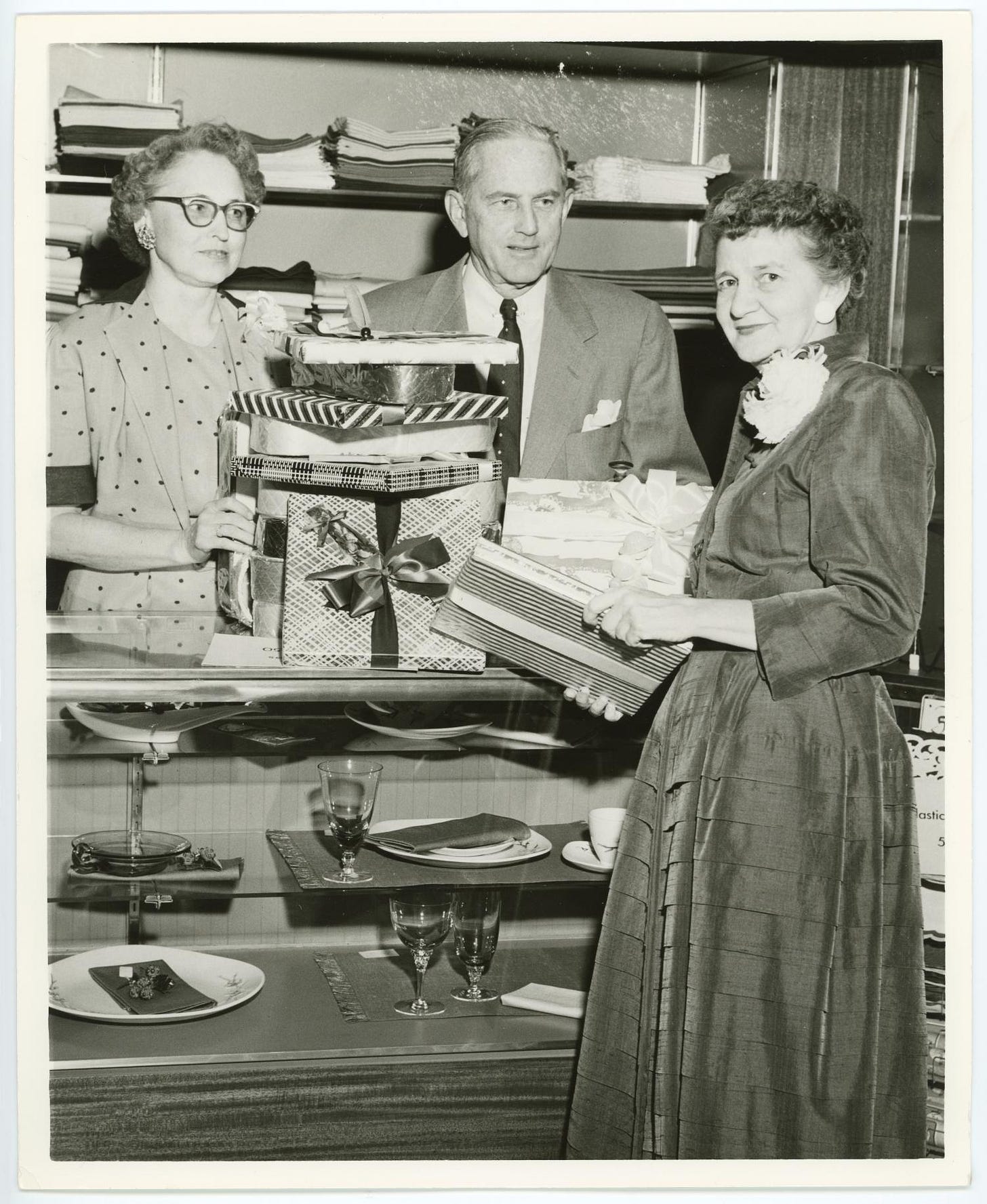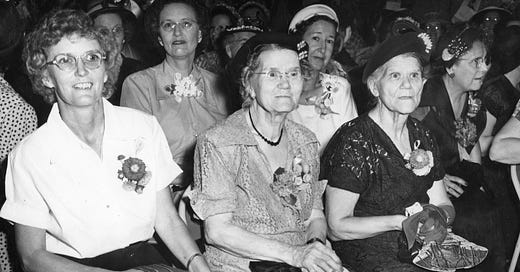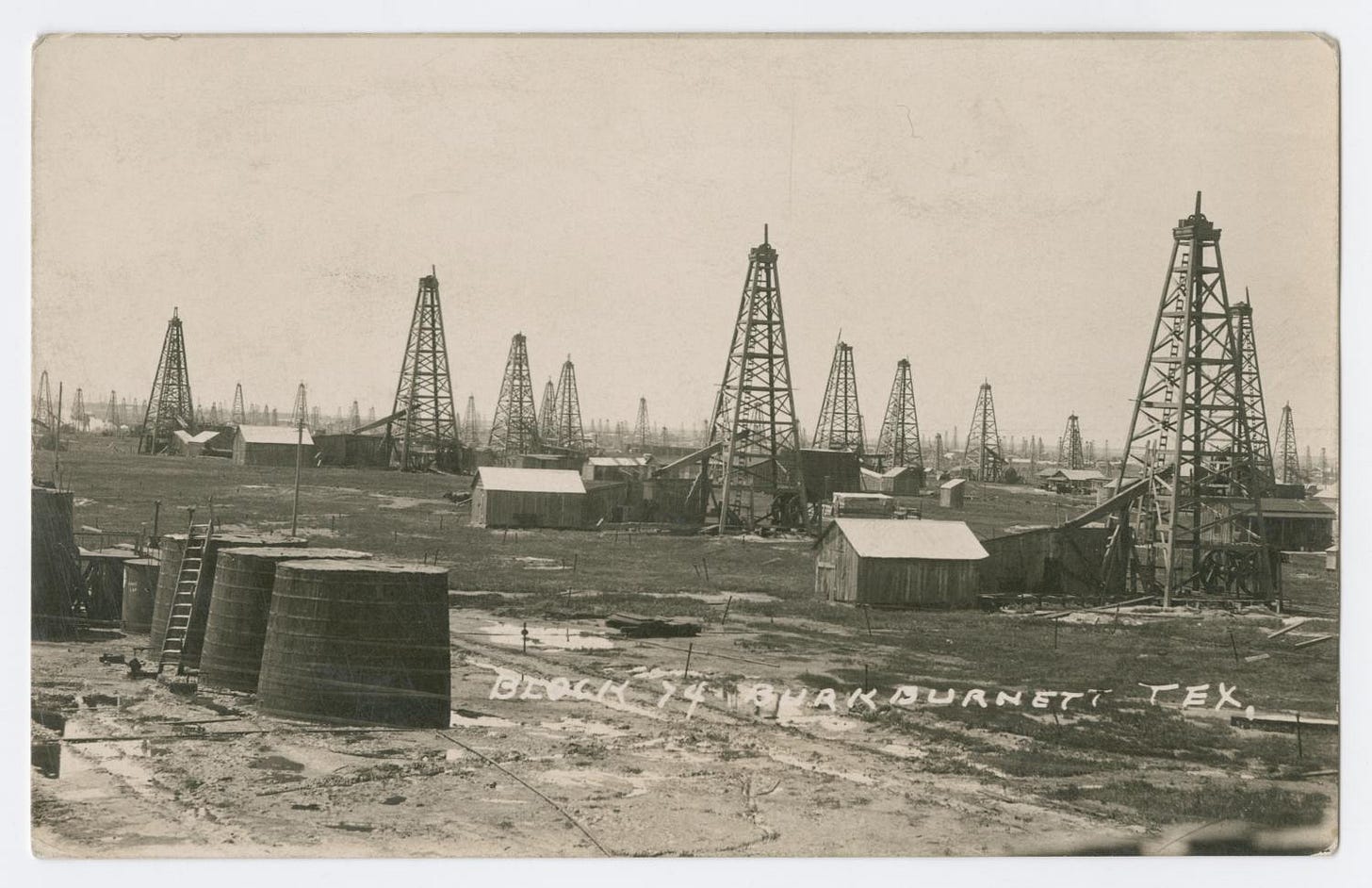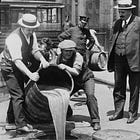Old Maids, Oilfields and a German chocolate cake
Plus a new feature, an old school newsletter
A group of women in Denton at the first Old Maid’s Day celebration in 1950. (Source: UNT Digital Library)
Release Date: February 11, 2025
“She was always pleasant”
Florence Lee Davis was born a week before Valentine’s Day 1891, the second of what would be five surviving children to Kate Stover and her husband, James Davis. Her mother was a first-generation native of Denton, TX, and that’s where Florence was born and would spend nearly all her life.
Her position as the eldest daughter in the family likely led Florence to become a teacher, that and the fact that teaching was still the most common choice for young women of the day who craved independence and a meaningful career.
It probably didn’t hurt that her hometown had one of the best teaching colleges in the state, either.
Established in 1890 as the North Texas Normal College, and rebranded as the University of North Texas (UNT) nearly a century later, Florence’s hometown teacher training college offered a two-year certificate program that allowed their mostly-female graduates to teach in Texas public schools.
It’s not known when Florence enrolled in that program, but in July 1913, she appeared as one of 75 graduates in the school’s yearbook.
While other students shared bits and pieces of poetry or wisdom next to their graduation photos – “Live one day at a time, and live that one day right”, “Of all the lights you carry on your face, Joy shines farthest out to sea”, and “O, miracle of women!” – 22-year-old Florence chose something a little less romantic for her legacy statement: “She was always pleasant”.
Florence would later say she earned both a four-year and an advanced degree at Denton’s teachers college, which suggests she returned to school sometime after 1919 when the school began granting a four-year bachelor’s degrees in education. Her master’s degree would have been completed in the 1930s when that option became available at the school, as well. Whether she taught while also getting her degrees is unknown but seems unlikely.
Whatever that timing looked like, Florence jumped right into teaching following her 1913 certification, accepting a position in Aubrey, a small community about 20 miles northeast of Denton. The location allowed her to continue to live at home with her parents and siblings and stay connected with friends in the community – Florence was after all, of marriageable age, and, by all accounts looking forward to the prospect.
World and local events, however, would conspire against those prospects, creating what historians call a “marriage squeeze” for women of the day, including Florence.
The summer after Florence’s first year as a teacher, Archduke Franz Ferdinand of Austria was assassinated, sparking what would be called “The Great War”, at least until 1939, when it suddenly became the First World War, thanks to Adolph Hitler’s invasion of Poland.
Although the United States wouldn’t enter WWI until April 6, 1917, patriotic men from across America, including many from Texas, joined Canadian or British forces and organizations like the Lafayette Escadrille (American pilots in the French Air Force) and the American Field Service (ambulance drivers in France) beginning as early as 1914.
And when America finally did enter the war, more than 198,000 Texas men volunteered or were drafted. Some never returned, and those who did were often changed—physically, emotionally, or both—making marriage and family life difficult.
But the pool of potential husbands for Florence and her peers wasn’t just impacted by world affairs.
Local events had an oversized impact, as well, especially the discovery of oil in north Texas. In 1917, a well nicknamed the “Roaring Ranger” struck black gold in Ranger, a small town between Denton and Abilene.
The following year, a massive oil field was discovered under Burkburnett, 100 miles northwest of Denton as the crow flies, and the North Texas oil boom was on.
Overnight, farm boys from Texas and across America became oilfield roughnecks, and small-time operators became rich oil barrens. Life in the oil fields was exciting, dangerous and transient, but wages were high, and in the anything-goes boom towns, young men who may have once considered settling down and getting married got a taste of a different sort of life.
In 1921, 30-year-old Florence left Denton and moved to Wichita Falls, just a stone’s throw away from Burkburnett in the heart of the north Texas oil field. It could be she went there to experience a different sort of life for herself, too. Then again, maybe she went to be closer to her sister, Madeline, and her family.
It’s unknown how long Florence taught in Wichita. The local paper record her classroom accomplishes at Austin School there through the 1921-1922 school year, and mention her as a resident of Charlotte Kemp Hall, the former family home of Joseph A. Kemp, a local oil and railroad magnate and philanthropist. The neo-classical style home was often called “the finest home owned by the richest man in Wichita.”
And what a home it was!
“The entire entry opened to a huge formal living room with Kemp’s study to one side, complete with his teak desk and large case clock. Flora Kemp’s conservatory was on the other side where she kept her extensive array of plants and flowers.
“The rear of the first floor housed a large kitchen, breakfast room, formal dining room and parlor for intimate gatherings. The staircase led to five large bedrooms, three baths and sitting area.” 1
At some point after Wichita Falls became the center of oilfield business, Joseph had turned his stately family home over to the YMCA, making it available to teachers like Florence who were otherwise unable to secure reasonable housing in the area. 2
And Joseph named the residence after his 20-year-old daughter, Charlotte, who had died in 1910.
Charlotte’s monument at Riverside Cemetery in Wichita Falls includes a beautiful marble statue of a young woman standing on a set of stairs which has fueled a local legend that Charlotte died after falling down the stairs on her wedding day. In truth, she had been ill with typhoid for more than a month, and was hospitalized in Detroit, MI at the time of her death. Still, the myth exists, and the monument has come to be called “the crying bride”.
By 1924, 33-year-old Florence was teaching in Dallas, TX, possibly at the invitation of her brother, William, who had moved there with his wife and family a few years earlier. Her time in the Big City – Dallas was home to over 220,000 people at the time – included a full slate of social and community activities as well as some travel outside her home state with friends, according to newspaper reports.
But, big city living wasn’t for Florence. Sometime before the 1930 census, she returned to the Denton area, likely to attend college full-time in pursuit of her advanced degree, and eventually began teaching Social Studies and English at the local junior high, a position she would hold until her retirement in 1956.
Florence’s life was full. She had a closeknit and supportive family, an active social life, a career that gave her both joy and purpose, and the financial independence to choose and follow her own path.
Still, as an unmarried woman of a “certain age”, society likely saw only what she lacked: a husband.
Dear Dorothy Dix – What would you do if you were kidded continually about being an old maid and always having one call you a man-hater when you are not one at all? As long as I have a good job, what need is there for me to rush in matrimony in order that I may not be called an old maid? C.M. R.
ANSWER: My dear girl, the sting in the old maid gibe died the day the first woman got a good join in a business office.
The term “old maid” is no more a stigma to a woman than is “old bachelor” to a man. It is merely a descriptive and shows that that particular woman, for reasons of her own, has not seen fit to marry. 3
Florence’s story is part of a larger project on German Chocolate Cake. Check out this video to learn more about that project’s origin story.
A celebration is born

In early 1950, 49-year-old Dorothy Babb, a Latin and English teacher at North Texas State College in Denton, TX, made an off-hand remark to a friend while the two women were shopping for a bridal shower gift: She was tired of buying gifts for weddings, baby showers, Mother’s Day and other events that only celebrated married women. As an unmarried women herself, Dorothy felt she was missing out on all that gift getting, and it was unfair.
Something should be done, she suggested.
Little did Dorothy know that her shopping companion, Dude Neville McCloud, a journalist instructor at the same college, would take that suggestion and run with it.
Within days, Dude had written up a press release calling for a day of celebration to be set aside to recognize women like her friend Dorothy, old maids. The story was picked up by the wire services, and a few short months later, Dorothy had her celebration — Old Maids Day.
The first Old Maids Day was held August 15, 1950 in Denton, and included a full slate of activities held exclusively for never-married women. There was an elegant tea luncheon with an elaborate menu and moving speeches given by prominent men in the community — ironic, right? And each woman was given flowers as well as gifts donated by local businesses.
The movie theatre in town hosted a special showing of the 1947 Three Stooges comedy, The Brideless Groom, and live entertainment was presented by ‘Fessor Floyd Graham and his orchestra, a popular Denton-based musical group.
More than 200 women showed up for the festivities, including Florence Davis, one of the founding members of the women’s club responsible for the celebration. 4
Old Maids Day was a huge hit, and would officially be celebrated in Denton for the next eight years, drawing thousands of women from all across America and the world together to unapologetically celebrate their unmarried status.
Although no longer celebrated in such grand scale, National Old Maids Day remains a somewhat obscure holiday, and this year falls on June 4.
Please hit the ❤️ button at the bottom of the page to help this story reach more readers. And if you’re not already a subscriber, I’d love to have you join me. Thanks!
“Spinster’s Special”
As part of the 1951 festivities around the second annual Old Maids Day, 60-year-old Florence Davis, “one of Denton’s honored spinsters”, was interviewed by a local reporter for an article titled, “Spinster’s Special: Miss Davis Charms Family with German Chocolate Cake Recipe”. 5
In that piece, Florence talked a bit about the celebration itself, sharing how much fun she’d had and that she was already looking forward to the next year’s celebration, and then spoke about what the reporter described as “an old maid’s hobby”, collecting plates.
"Her collection includes one family heirloom which dates back to 1860. It was given to her by her grandmother.
“One of her Old Maid’s Day gifts this year was a plate of French Haviland china given to her by a neighbor. Miss Davis was “overwhelmed” with the gift, especially since it was one of the neighbor’s family heirlooms.”
Although much of the stigma around being an unmarried woman had ended by the time of the interview — thanks in large part to the role women had played in keeping the American economy going during WWII —the female reporter’s question highlighted the fact that “old maid” and “spinster” were still loaded terms, even especially among other married women.
Historically, that hadn’t always been the case.
As far back as the 1500s, “spinster” referred to any woman who spun thread for a living. Spinning was often women’s work, and since unmarried women frequently engaged in that trade, the term became associated with single women in legal and social records. By the 18th century, “spinster” had become an accepted and legal term to denote an unmarried woman of marriageable age.
No judgement there.
About that same time, however, another word came along, and it carried a lot more judgment. That term was “old maid”. An old maid was an unmarried woman well past marriageable age, and the fault for her lack of a husband was placed firmly on her: She was prudish, fussy, socially awkward. Set in her ways and often difficult. Not just unmarried, but un-marriageable.
No wonder the women of Denton — and America — wanted to take back the term, celebrate their unmarried status, and show the world they were anything but bitter and pitiful “old maids”!
The 1951 interview ended with Florence sharing the recipe for her favorite cake, one she’d served just the day before during a small gathering of friends. I share it here in her honor, as as a nod to the richness of women everywhere, independent of their marital status.
Florence Davis passed away in Denton on August 24, 1974 at the age of 83. She remained a proud old maid to the end.
Copyright 2025 Lori Olson White
Florence Davis’ German Sweet Chocolate Cake
Cake Ingredients:
2 cups sugar
1 package German Sweet chocolate dissolved in ¼ cup hot water
1 teaspoon soda (mixed with buttermilk)
2 ½ cups cake flour
1 cup shortening
¾ cup buttermilk
4 eggs
pinch of salt
vanilla
Cream sugar and shortening. Add beaten egg yolks, Beat until light and creamy. Add flour alternatively with milk. Fold in stiffly. Beaten egg whites. Add vanilla. Bake three layers in moderate oven for about 20 minutes.
Frosting Ingredients:
¼ pound butter
1 egg yolk
Cold coffee or cream
3 tablespoons cocoa
1 box confectioners’ sugar
Chopped pecans
Mix butter, cocoa and eggs until smooth. Sift in sugar and use cold coffee or cream to make spreading consistency. Top with chopped pecans. 6
Be sure to check out Call Me a Bastard, a my longest serialized story today, and the lost and found that started it all here on the Lost & Found Story Box. I’ve added a link to Chapter 1 which introduces you to Aimee Henry and Mary Martha Parker.
And, in case you missed it, here’s a link to my most popular short series, The Incorrigible John George. I hope you’ll agree that “incorrigible” is the best way to describe this old scoundrel!
The Lost & Found Story Box is reader-supported. When you buy through links on our site, we may earn an affiliate commission.
End Notes
1 “Have you heard of the Kemp house? What to know about “the finest home owned by the richest man” by Lynn Walker, The Wichita Falls Times Record News, Wichita Falls, TX, October 7, 2021.
2 “Kemp Day”, or the Story of a Dream that Became a Reality Because the Dreamer had Vision and Courage and Never Knew When Whipped,” Times Record News, Wichita Falls, TX, December 11, 1921, P. 11.
3 “Being an Old Maid no Longer Joke it Once Was”, Dorothy Dixon, The News Tribune, Tacoma, WA, May 27, 1926, P. 15.
4 “Tea, Free Show Set for Honorees; Mayor Proclaims Tuesday as ‘Old Maids Day’ Here,” Denton Record-Chronicle, Denton, TX, August 13, 1950, P. 5.
5 “Spinster’s Special: Miss Davis Charms Family with German Cake Recipe”, by Junette Watson, Denton Record-Chronicle, Denton, TX August 16, 1951, p.9.
6 “Spinster’s Special: Miss Davis Charms Family with German Cake Recipe”, by Junette Watson, Denton Record-Chronicle, Denton, TX August 16, 1951, p.9.











Great story. Am so happy she didn’t marry. She would have been forced to stop teaching because of the marriage bar which stayed in effect until the 1970s(!!!)
What a great theme you have skilfully woven in the Old Maid’s Day story - I enjoyed getting to know Florence! Hats off to her! I was a little overwhelmed with the comprehensive length and content of this post, so I will need to return to catch up on the rest!